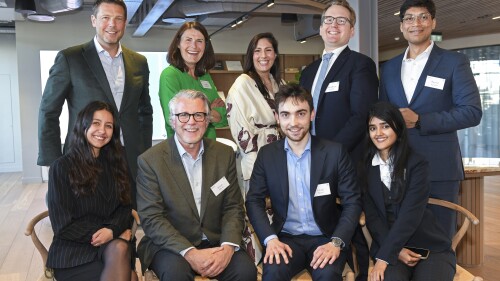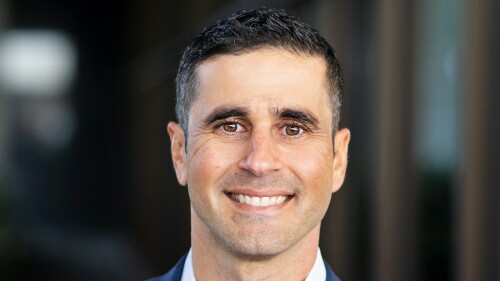Delegates at ULI Japan’s recent Spring Conference, held in Tokyo, heard from a number of landlords operating a number of different models for office occupation about how their operations worked and their thoughts on the future. A discussion panel on new modes of office occupation was followed by a closing keynote from Peter Weingarten, regional managing principal for the Asia Pacific region at Gensler, with a philosophical and practical take on office occupation.
The panel featured Takashi Utagawa, general manager, business development, consulting and development department at Mitsubishi Estate, representing the more traditional office landlord; Noelle Coak, Regus’s Japan-based head of Thailand, Taiwan, and Korea, the serviced-office operator; and Alexander Paessler, vice president of real estate, Asia Pacific, at WeWork, representing the coworking niche of the market. Gensler’s Japan representative Nachiko Yamamoto added a designer’s voice to the discussion.
Hidetoshi Ono, managing director, Japan real estate, for Manulife Japan, moderated the session and gave an immediate anecdotal frame to the discussion by saying: “We have seen at Manulife that by changing the working environment you can change people’s mind-set and increase employee satisfaction.”
Regus’s Coak argued that coworking continues to be an important trend in the office sector, with her company’s Spaces brand offering coworking facilities similar to those of WeWork. But Regus also offers other leasing models for tenants preferring full-service office space.
One delegate asked Paessler whether Starbucks was actually WeWork’s main competitor. He defended WeWork, saying: “Our coffee is better, and it is free.”
Paessler stressed the point that WeWork’s unique selling proposition is the collaborative experience offered to its members—for example, 70 percent of WeWork members have done business with one another—and its technology, more than its trendy workspace. “The biggest WeWork team is our digital team,” he said.
WeWork is not yet in Japan, but Paessler said the company hoped to secure space by the end of the year and said—in response to questions from the audience—that coworking was suitable for all markets, even if there was a preference for private space rather than shared space. “Coworking is about providing an environment in which companies can interact; it does not have to be an open shared space. We encourage people to trade through our network.”
Mitsubishi Estate’s Utagawa explained how the developer was offering smaller and more flexible spaces for startups and smaller companies within its portfolio. The company is also experimenting with its own occupied space: it has plans to make pass cards for employees to track their movements in order for “big data” to see how they can best be accommodated to boost productivity.
Like many landlords, Mitsubishi Estate appreciates that startups will be the multinational companies of the future and it has experimented with taking stock in new ventures in lieu of rental payments. Utagawa said that the initiative had not been entirely successful, due to the difficulty in valuing new companies, but it sparked the interest of a number of landlords in the audience. Wrapping up the conference, GIC Real Estate Japan representative and ULI Japan council vice chair Ken Chan said that the discussion had led him to think about GIC’s office investments and how they fit with modern working practices.
Both the Regus and WeWork representatives were keen to stress that their companies were a benefit to property owners, rather than a threat. Coak said: “We are very focused on relationships with our landlords.”
Gensler’s Yamamoto made an interesting contribution to the discussion: she suggested that developers include collaborative workspaces in their new buildings, rather than waiting for a coworking tenant to provide such space as a third party. She also noted that—in her experience—Japanese companies were perhaps not as committed to the changing workplace as others.
“Why do we have to leave who we are behind when we go to work?’ asked Gensler’s Weingarten in his closing keynote address. He argued that working practices were moving naturally to a more collaborative and level environment, from the restricted and hierarchical working practices of the past. Thus, community replaces hierarchy, empowerment replaces control, and the employee becomes an entrepreneur.
A key point was that if a business wants to change the way it operates, changing the working environment is actually the easiest way—and is far more simple than trying to directly change business culture. “And if it does not work, then rip it out and try something else!” he said.
Tech firms have become a massive driver of the U.S. economy and its real estate market, with 20 percent of leasing deals involving tech firms, Weingarten said. However, just because new-economy companies are driving the economy, it does not follow that their office space decisions are necessarily right, he argued, pointing out that Apple’s new ring-shaped building has poor cross-connectivity due to its design. He also showed that Facebook’s single-floor building—a mass of desks in a huge, high-ceilinged workspace—looks suspiciously like an old-fashioned office floor.
Nonetheless, Weingarten showed that employee interaction was greatest across a single floor (although presumably single floors smaller than Apple’s 797,000-square-foot [74,000 sq m] campus building). Employees who work on the same floor have a 95 percent chance of interacting on any given day, Gensler found. However, for those working on different floors, this likelihood fell to 5 percent, and for employees in different buildings, 0.2 percent.
He noted that Gensler clients took a more holistic approach to workplace design these days. In the past, they might have approached the company with questions about square footage and number of desks, whereas today they were concerned with “brand, culture, and experience.”
Today, he said, they ask: “How do we capture the soul of our company?”

![Western Plaza Improvements [1].jpg](https://cdn-ul.uli.org/dims4/default/15205ec/2147483647/strip/true/crop/1919x1078+0+0/resize/500x281!/quality/90/?url=https%3A%2F%2Fk2-prod-uli.s3.us-east-1.amazonaws.com%2Fbrightspot%2Fb4%2Ffa%2F5da7da1e442091ea01b5d8724354%2Fwestern-plaza-improvements-1.jpg)


